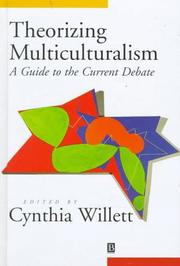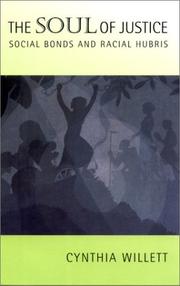| Listing 1 - 10 of 12 | << page >> |
Sort by
|

ISBN: 0631203427 0631203419 9780631203421 Year: 1998 Publisher: Oxford Blackwell
Abstract | Keywords | Export | Availability | Bookmark
 Loading...
Loading...Choose an application
- Reference Manager
- EndNote
- RefWorks (Direct export to RefWorks)
Philosophy and psychology of culture --- Literature --- Multiculturalism --- Cultural pluralism --- Cultural pluralism. --- Multiculturalism. --- Cultural diversity policy --- Cultural pluralism policy --- Ethnic diversity policy --- Social policy --- Anti-racism --- Ethnicity --- Cultural fusion --- Cultural diversity --- Diversity, Cultural --- Diversity, Religious --- Ethnic diversity --- Pluralism (Social sciences) --- Pluralism, Cultural --- Religious diversity --- Culture --- Government policy
Book
ISBN: 128226320X 025300313X 9786612263200 9780253003133 9780253351661 0253351669 9780253219947 0253219949 Year: 2008 Publisher: Bloomington, Ind. Indiana University Press
Abstract | Keywords | Export | Availability | Bookmark
 Loading...
Loading...Choose an application
- Reference Manager
- EndNote
- RefWorks (Direct export to RefWorks)
Comedy, from social ridicule to the unruly laughter of the carnival, provides effective tools for reinforcing social patterns of domination as well as weapons for emancipation. In Irony in the Age of Empire, Cynthia Willett asks: What could embody liberation better than laughter? Why do the oppressed laugh? What vision does the comic world prescribe? For Willett, the comic trumps standard liberal accounts of freedom by drawing attention to bodies, affects, and intimate relationships, topics which are usually neglected by political philosophy. Willett's philosophical reflection on comedy issues a powerful challenge to standard conceptions of freedom by proposing a new kind of freedom that is unapologetically feminist, queer, and multiracial. This book provides a wide-ranging, original, thoughtful, and expansive discussion of citizenship, social manners, and political freedom in our world today.
Comedy --- Comic literature --- Literature, Comic --- Drama --- Wit and humor --- Social aspects --- Political aspects --- Political philosophy. Social philosophy --- United States --- United States of America

ISBN: 1501711636 9781501711633 0801438918 9780801438912 0801487153 9780801487156 Year: 2001 Publisher: Ithaca (N.Y.): Cornell university press
Abstract | Keywords | Export | Availability | Bookmark
 Loading...
Loading...Choose an application
- Reference Manager
- EndNote
- RefWorks (Direct export to RefWorks)
Cynthia Willett brings together diverse insights from social psychology, classical and contemporary literature, and legal and justice theory to redefine the basis of the moral and legal person.Feminists, communitarians, and postmodern thinkers have made clear that classical liberalism, with its emphasis on individual autonomy and excessive rationalism, is severely limited. Although she is sympathetic with the liberal view, Willett finds it necessary to go further. For her, attention to the social dimensions of the family and civil society is critical if issues of race, gender, class, and sexuality are to be taken seriously. Interdependency, not autonomy, is of increasing significance in an era of globalization.Willett proposes an alternate normative theory that recognizes the impact of social forces on individual well-being. Citizenship in a democracy should not be defined solely on the basis of rights to autonomy, such as bare rights to property or free speech, she explains. Rather, citizenship should be defined first of all in terms of the rights, responsibilities, and capacities of the social person.It is within the African American tradition of political thought that Willett finds a more useful definition of human identity and political freedom. The African American experience offers a compelling vision of social change and a deeper understanding of what it means to be a social person. By focusing on everyday battles against racism, Willett contends, we can gain valuable insight into the meaning of justice.
African Americans --- Individualism. --- Liberalism. --- Social justice. --- Negritude --- Economics --- Equality --- Political science --- Self-interest --- Sociology --- Libertarianism --- Personalism --- Persons --- Liberal egalitarianism --- Liberty --- Social sciences --- Justice --- Social conditions. --- Race identity. --- Ethnic identity --- Individualism --- Liberalism --- Social justice --- Race identity --- Social conditions
Book
ISBN: 9780231167765 9780231167772 Year: 2014 Publisher: New York Columbia University Press
Abstract | Keywords | Export | Availability | Bookmark
 Loading...
Loading...Choose an application
- Reference Manager
- EndNote
- RefWorks (Direct export to RefWorks)
Human-animal relationships --- Ethics --- Speciesism --- Moral and ethical aspects --- Philosophy
Book
ISBN: 0231538146 9780231538145 9780231167765 0231167768 9780231167772 0231167776 Year: 2014 Publisher: New York
Abstract | Keywords | Export | Availability | Bookmark
 Loading...
Loading...Choose an application
- Reference Manager
- EndNote
- RefWorks (Direct export to RefWorks)
Interspecies Ethics explores animals' vast capacity for agency, justice, solidarity, humor, and communication across species. The social bonds diverse animals form provide a remarkable model for communitarian justice and cosmopolitan peace, challenging the human exceptionalism that drives modern moral theory. Situating biosocial ethics firmly within coevolutionary processes, this volume has profound implications for work in social and political thought, contemporary pragmatism, Africana thought, and continental philosophy. Interspecies Ethics develops a communitarian model for multispecies ethics, rebalancing the overemphasis on competition in the original Darwinian paradigm by drawing out and stressing the cooperationist aspects of evolutionary theory through mutual aid. The book's ethical vision offers an alternative to utilitarian, deontological, and virtue ethics, building its argument through rich anecdotes and clear explanations of recent scientific discoveries regarding animals and their agency. Geared toward a general as well as a philosophical audience, the text illuminates a variety of theories and contrasting approaches, tracing the contours of a post-moral ethics.
Human-animal relationships --- Ethics. --- Speciesism. --- Moral and ethical aspects. --- Philosophy.
Book
Year: 1998 Publisher: Cambridge, Mass Oxford Blackwell
Abstract | Keywords | Export | Availability | Bookmark
 Loading...
Loading...Choose an application
- Reference Manager
- EndNote
- RefWorks (Direct export to RefWorks)
Book
Year: 2010 Publisher: Chicago (Ill.): DePaul university,
Abstract | Keywords | Export | Availability | Bookmark
 Loading...
Loading...Choose an application
- Reference Manager
- EndNote
- RefWorks (Direct export to RefWorks)
Book
Year: 2011 Publisher: Chicago (Ill.): DePaul university,
Abstract | Keywords | Export | Availability | Bookmark
 Loading...
Loading...Choose an application
- Reference Manager
- EndNote
- RefWorks (Direct export to RefWorks)
Digital
ISBN: 9781517908287 9781517908294 Year: 2019 Publisher: Minneapolis, Minn. University of Minnesota Press
Abstract | Keywords | Export | Availability | Bookmark
 Loading...
Loading...Choose an application
- Reference Manager
- EndNote
- RefWorks (Direct export to RefWorks)
Philosophy and psychology of culture --- Sociology of the family. Sociology of sexuality --- Race --- Feminism --- Gender --- Humour --- Theory
Book
ISBN: 1452962219 1517908299 Year: 2019 Publisher: Minneapolis, Minnesota ; London : University of Minnesota Press,
Abstract | Keywords | Export | Availability | Bookmark
 Loading...
Loading...Choose an application
- Reference Manager
- EndNote
- RefWorks (Direct export to RefWorks)
| Listing 1 - 10 of 12 | << page >> |
Sort by
|

 Search
Search Feedback
Feedback About UniCat
About UniCat  Help
Help News
News